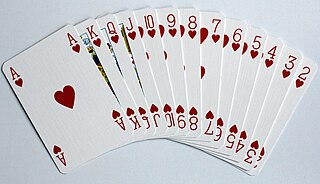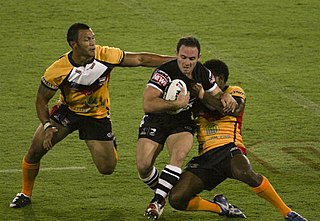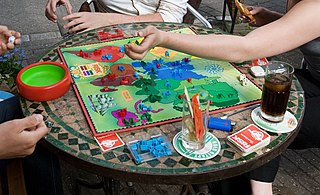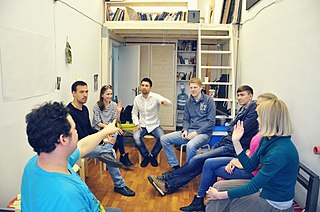
Hearts is an "evasion-type" trick-taking playing card game for four players, although most variations can accommodate between three and six players. It was first recorded in America in the 1880s and has many variants, some of which are also referred to as "Hearts", especially the games of Black Lady and Black Maria. The game is a member of the Whist group of trick-taking games, but is unusual among Whist variants in that it is a trick-avoidance game; players avoid winning certain penalty cards in tricks, usually by avoiding winning tricks altogether. The original game of Hearts is still current but has been overtaken in popularity by Black Lady in the United States and Black Maria in Great Britain.

Mahjong or mah-jongg is a tile-based game that was developed in the 19th century in China and has spread throughout the world since the early 20th century. It is played by four players. The game and its regional variants are widely played throughout East and Southeast Asia and have also become popular in Western countries. The game has also been adapted into a widespread online entertainment. Similar to the Western card game rummy, mahjong is a game of skill, strategy, and luck. To distinguish it from mahjong solitaire, it is sometimes referred to as mahjong rummy.

Rugby league football, commonly known as rugby league in English-speaking countries and rugby XIII in non-Anglophone Europe and South America, and referred to colloquially as rugby, football, footy or league in its heartlands, is a full-contact sport played by two teams of thirteen players on a rectangular field measuring 68 m (74 yd) wide and 112–122 m (122–133 yd) long with H-shaped posts at both ends. It is one of the two major codes of rugby football, the other being rugby union. It originated in 1895 in Huddersfield, Yorkshire, England, as the result of a split from the Rugby Football Union (RFU) over the issue of payments to players. The rules of the game governed by the new Northern Rugby Football Union progressively changed from those of the RFU with the specific aim of producing a faster and more entertaining game to appeal to spectators, on whose income the new organisation and its members depended.

Risk is a strategy board game of diplomacy, conflict and conquest for two to six players. The standard version is played on a board depicting a political map of the world, divided into 42 territories, which are grouped into six continents. Turns rotate among players who control armies of playing pieces with which they attempt to capture territories from other players, with results determined by dice rolls. Players may form and dissolve alliances during the course of the game. The goal of the game is to occupy every territory on the board and, in doing so, eliminate the other players. The game can be lengthy, requiring several hours to multiple days to finish. European versions are structured so that each player has a limited "secret mission" objective that shortens the game.

Pig is a simple, collecting card game of early 20th century American origin suitable for three to thirteen players that is played with a 52-card French-suited pack. It has two very similar and well known variants – donkey and spoons. It is often classed as a children's game. It may be descended from an old game called vive l'amour.

Mafia, also known as Werewolf, is a Russian social deduction game created by Dimitry Davidoff in 1986. The game models a conflict between two groups: an informed minority and an uninformed majority. At the start of the game, each player is secretly assigned a role affiliated with one of these teams. The game has two alternating phases: first, a night-phase, during which those with night-killing-powers may covertly kill other players, and second, a day-phase, in which all surviving players debate and vote to eliminate a suspect. The game continues until a faction achieves its win-condition; for the village, this usually means eliminating the evil minority, while for the minority, this usually means reaching numerical parity with the village and eliminating any rival evil groups.
Portable Game Notation (PGN) is a standard plain text format for recording chess games, which can be read by humans and is also supported by most chess software.

Cheat is a card game where the players aim to get rid of all of their cards. It is a game of deception, with cards being played face-down and players being permitted to lie about the cards they have played. A challenge is usually made by players calling out the name of the game, and the loser of a challenge has to pick up every card played so far. Cheat is classed as a party game. As with many card games, cheat has an oral tradition and so people are taught the game under different names.

Capture the Flag (CTF) is a traditional outdoor sport where two or more teams each have a flag and the objective is to capture the other team's flag, located at the team's "base", and bring it safely back to their own base. Enemy players can be "tagged" by players when out of their home territory and, depending on the rules, they may be out of the game, become members of the opposite team, be sent back to their own territory, be frozen in place, or be sent to "jail" until freed by a member of their own team.

Tag is a playground game involving one or more players chasing other players in an attempt to "tag" and mark them out of play, usually by touching with a hand. There are many variations; most forms have no teams, scores, or equipment. Usually, when a person is tagged, the tagger says, "Tag, you're 'It'!". The last one tagged during tag is "It" for the next round. The game is known by other names in various parts of the world, including "running and catching" in India and "catch and cook" in the Middle East.

Kick the can, is an outdoor children's game related to tag, hide and seek, and capture the flag, played with as few as three to as many as several dozen players. The game is one of skill, strategy, stealth, and stamina.

Manhunt is a 2003 stealth game developed by Rockstar North and published by Rockstar Games. The first entry in the Manhunt series, it was released for the PlayStation 2 in November 2003, followed by Microsoft Windows and Xbox releases in April 2004. Set within the fictional Carcer City, the story follows James Earl Cash, a death row prisoner who is forced to participate in a series of snuff films, earning his freedom by murdering criminal gang members sent to hunt him on camera.

Burnout 3: Takedown is a 2004 racing video game developed by Criterion Games and published by Electronic Arts. It is the third instalment in the Burnout series, which is characterised by fast-paced arcade racing. A staple of the series is the use of boost, earned through risky driving, to rapidly increase a car's speed. The central mechanic introduced in Burnout 3 is Takedowns, which allow players to slam their opponents until they crash. Takedowns work in conjunction with the boost system by filling up and extending the boost meter. Aside from standard circuit races, the game features modes focused on performing Takedowns on rival vehicles and causing monetary damage at a junction occupied with traffic. Each game variant is featured in a single-player campaign mode called World Tour, which serves as the primary method for unlocking new and faster cars. The game supports both online and split-screen multiplayer.
Pitch is the American name of the English trick-taking game of Blind All Fours which, in turn, is derived from classic All Fours. Historically, Pitch started as "Blind All Fours", a very simple All Fours variant that is still played in England as a pub game. The modern game involving a bidding phase and setting back a party's score if the bid is not reached came up in the middle of the 19th century and is more precisely known as Auction Pitch or Setback.

British Bulldog is a tag-based playground and sporting game, commonly played in schoolyards and on athletic fields in the UK, Canada, South Africa, Australia, and related Commonwealth countries, as well as in the U.S. and Ireland. The object of the game is for one player to attempt to intercept other players who are obliged to run from one designated area to another. British Bulldog is characterised by its physicality and is often regarded as violent, leading it to be banned from many schools due to injuries to the participants.
Magic: The Gathering formats are various ways in which the Magic: The Gathering collectible card game can be played. Each format provides rules for deck construction and gameplay, with many confining the pool of permitted cards to those released in a specified group of Magic card sets. The Wizards Play Network, the governing body that oversees official Magic competitive play, categorizes its tournament formats into Constructed and Limited. Additionally, there are many casual formats with the Commander format being one of the most popular formats of the game.
Traditional Filipino games or indigenous games in the Philippines are games that have been played across multiple generations, usually using native materials or instruments. In the Philippines, due to limited resources for toys, children usually invent games without needing anything but players.There are different kinds of Philippine Traditional Games that are suited for kids, and the games also stand as one of the different culture and/or traditional games of the Philippines. These games are not only fun to play, but these games are also good for you. This is because different games require different skills. These games are also an important part in Filipino culture.
Steal the bacon is a tag-based traditional children's game, in which teams try to steal a flag or other item from the field without being tagged. The game is played with players divided into teams and assigned a call-signs, and a referee to call out the call signs. There are variations on gameplay, including rules that increase educational value or physicality.

A chess variant is a game related to, derived from, or inspired by chess. Such variants can differ from chess in many different ways.













